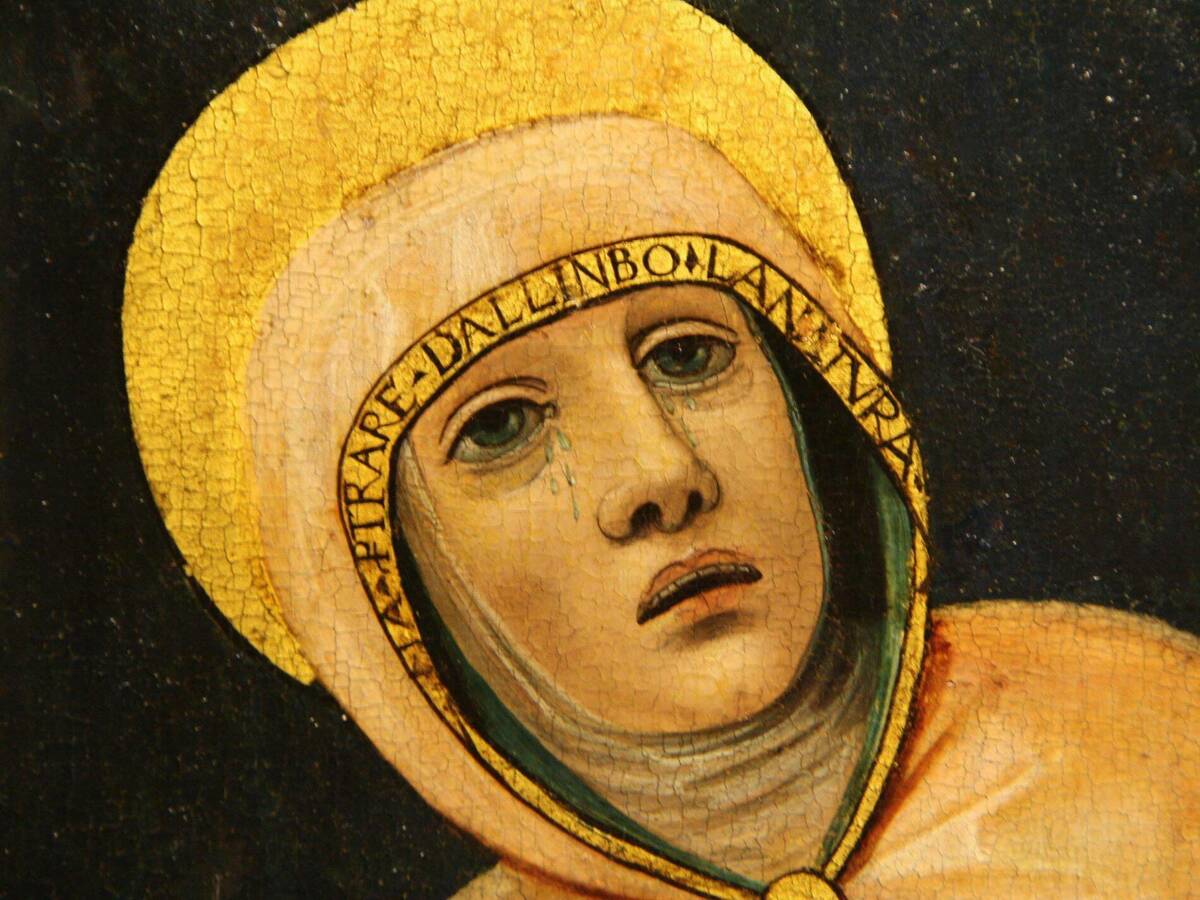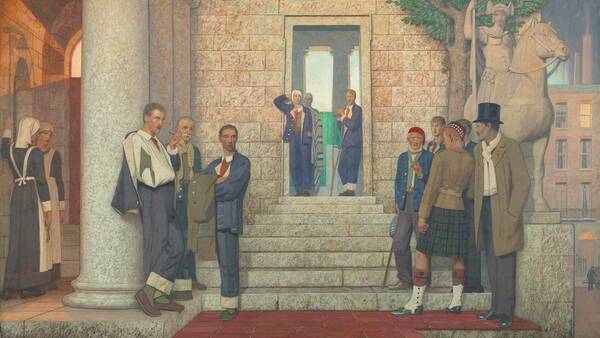My mom passed away one year ago after a three-year-long bout with colon cancer. In all things, she was a valiant witness to Christian faith, hope, and charity, and hers was a life well-lived. And yet, the pain of loss has been suffocating and unbearable. As C. S. Lewis, who lost his wife to bone cancer when she was just forty-five, writes: “Her absence is like the sky, spread over everything.” Our lives are woven together with the threads of our relationships and our loves—and when one of these threads is pulled loose, the rest can easily unravel. The loss of a loved one brings with it uncertainty and fear about the future. At the time of my mom’s passing, I was only thirty-two, and while I had over three decades of life with her by my side, I did not yet have any without her. What would the next year and decade be like, alone, without her stabilizing presence? It is impossible to know, but the harsh reality is that these will be years spent without her, grieving what could have been but will not be, longing for what hopefully will be but is not yet and may never be.
Grief and sorrow are Christian realities because they are human realities, and nothing truly human escapes the Christian experience. Job grieves the loss of his family; Hannah laments her barren womb; and David bemoans his executed son. “Absalom, Absalom!” the king cries over the corpse of the child who had usurped the royal throne. In the New Testament, Christ famously wept over the death of his friend, Lazarus, even though he would raise him from the dead shortly thereafter. Death, sorrow, loss, and grief, all of these deeply human realities, are baked into the very fabric of both human life but also of salvation history and are in some sense willed by God, for he is the Creator and Lord of all and no evil and suffering occur outside of his divine acquiescence.
And yet, in such moments, we cannot help but feel like these experiences are outside the purview of God’s presence when they happen to us or to a loved one. Death is to be expected—is it not?—for all creatures, for the life of the spider is the death of the fly. And yet, when we come face-to-face with it, we cannot but feel like this is not how things ought to be, for we cannot bear the weight of loss. Like Mary on the Via Dolorosa and at the foot of the Cross, our hearts are pierced by the twin swords of suffering and grief, fully cognizant of the fact that this is just not how life is supposed to be.
In such moments, St. Paul’s injunction in 1 Thessalonians 4 to “not grieve as others do who have no hope” falls on deaf ears and lifeless hearts too weary and too tired to be instructed otherwise. In a letter to Paula, St. Jerome wrote, “If you really believed your daughter to be alive, you would not grieve that she had passed to a better world.” He either must have not experienced true loss or was simply made of sterner stuff than I. But St. Augustine, a contemporary of Jerome, when commenting on this same passage writes, “Paul didn’t just say that you may not be saddened, but that you may not be saddened as the heathen are, who do not have any hope. It is unavoidable, after all, that you should be saddened; but when you feel sad, let hope console you.” And along with Augustine, St. Gregory of Nyssa, upon the occasion of the death of Bishop Meletius, counsels his flock similarly: “Let alone, you that would console; let alone; force not on us your consolation. Let the widow mourn deeply. Let her perceive the loss that has been inflicted on her.”
Perhaps before the loss of my mom I would have stood alongside Jerome and encouraged others to do so as well, but, having come face-to-face with death, I cannot help siding with Augustine and Gregory. Hope-filled or not, we cannot but grieve and weep over the loss of our friends and family when they die, for we grieve because we love, and love does not cease with death. “Grief is a weeping love,” writes William Desmond.
It has been one year since mom passed, though it has felt at times both far longer and shorter. A single day is like a thousand years for the Lord, and, for those who mourn, a year is both everything and nothing. I still struggle to breathe when I remember that she is gone, really gone: when, out of a life-long ingrained habit, my hand moves to call or text her, but to no avail. The temptation is to retreat deep within and barricade the doors shut once and for all so as to eliminate the pain, the agony, but, were I to do so, love, too, would be lost.
“To love at all is to be vulnerable,” writes Lewis in The Four Loves. He continues:
Love anything and your heart will be wrung and possibly broken. If you want to make sure of keeping it intact you must give it to no one, not even an animal. Wrap it carefully round with hobbies and little luxuries; avoid all entanglements. Lock it up safe in the casket or coffin of your selfishness. But in that casket, safe, dark, motionless, airless, it will change. It will not be broken; it will become unbreakable, impenetrable, irredeemable. To love is to be vulnerable.
Grief-ridden vulnerability is the only viable option for anyone who has been pierced by the arrow of loss. And in these poignant moments, the Lord is close to us, for “the Lord is near to the brokenhearted, and saves the crushed in spirit” (Ps 34:18). And yet, King David rightly asks in Psalm 8: “When I look at thy heavens, the work of thy fingers, the moon and the stars which thou hast established; what is man that thou art mindful of him, and the son of man that thou dost care for him?” In moments of loss, it is only too easy to think and feel as if God is too great, too immense, too divine to have any concern with human tragedy.
“But although we may think that in this way we are speaking about God in an appropriately divine manner,” writes Joseph Ratzinger,
in reality we are in fact thinking of him in a very petty and only too human way, as if he had to be selective so as not to miss the overview . . . . In contrast to such limited notions, the aphorism [of] Holderlin . . . will serve to recall the Christian image of the true greatness of God: ‘Non coerceri maximo, contineri tamen a minimo, divinum est’ (Not to be encompassed by the greatest, but to let oneself be encompassed by the smallest—that is divine). The boundless spirit who bears in himself the totality of Being reaches beyond the ‘greatest,’ so that to him it is small, and he reaches into the smallest, because to him nothing is too small. . . . To him who as spirit upholds and encompasses the universe, a spirit, a man’s heart with its ability to love, is greater than all the milky ways in the universe.
“Not to be encompassed by the greatest, but to let oneself be encompassed by the smallest—that is divine.” As all who have risked comfort and safety for love know, to allow oneself to be encompassed by that which is otherwise small, the particular, this person, is not only divine but also human, or, rather, it is human because it is divine, for we are made in the image of God, and God alone makes human love and sorrow possible.
Because God’s greatness entails the ability to be encompassed by that which is small, the risen Lord grieves in and with us, for the Sacred Heart of Jesus, which weeps with those who weep and rejoices with those who rejoice, is the beating heart of God, and the divine love that moves this heart knows no limits, no end. Just as Christ descended into the abyss of Hell, so, too, does he descend into the void of tragedy and loss that we carry within us from the death of our loved ones. “If I say, ‘Let only darkness cover me, and the light about me be night,’ even the darkness is not dark to thee, the night is bright as the day; for darkness is as light with thee” (Ps 139:1–12).
Christ, of course, does not take away the pain of loss, but he can transform it into something—dare I say?—beautiful through the gift of hope, for Christian hope opens unforeseen vistas and horizons to a human love that perseveres to the end. This was undoubtedly the experience of Mary, who had to watch her son suffer and die at the hands of his persecutors, but lived her remaining years in hope as Mother of the Church, until she was assumed into Christ’s embrace and crowned Queen of Heaven and Earth. This, too, has been my experience as well, even in the midst of a grief that has simply become part of my newfound identity and daily experience. Hope, I have learned, is the difference between life and death—Heaven and Hell—and this is offered to all who grieve, even now.
EDITORIAL NOTE: A version of this essay originally appeared in the Fall 2023 issue of Joie de Vivre. Reprinted here with the author’s permission, ALL RIGHTS REVERSED.


